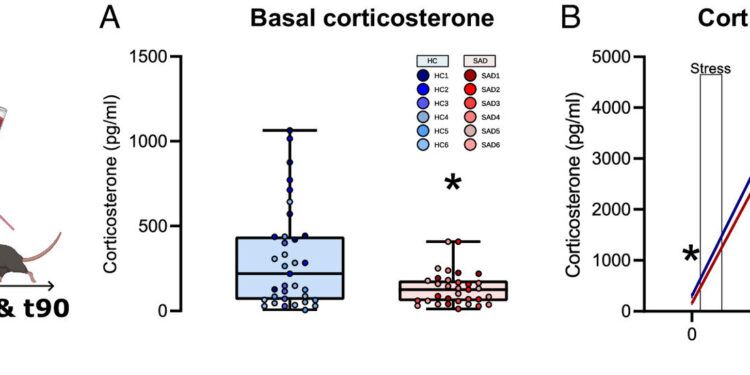SAD FMT modulates plasma levels of corticosterone, the basal stress hormone. (A) Basal plasma corticosterone is significantly reduced in the SAD group compared to the HC group (B) The timeline of the stress response measured by plasma corticosterone collected at 30 min intervals over 90 min. There was a significantly lower concentration of plasma corticosterone at the basal time point (0 min) in the SAD group compared to the HC group and no significant effects at the 30, 60, or 90 min time points. Credit: Proceedings of the National Academy of Sciences (2023). DOI: 10.1073/pnas.2308706120
A large team of medical, psychological and social researchers from University College Cork, Ireland, working with a colleague from University Hospital Frankfurt, Germany, discovered that certain microbes in the gut biome may play a role in the disorder of social anxiety. In their study reported in the Proceedings of the National Academy of Sciences the group conducted experiments with fecal transplants in mice and tested them for anxiety.
Social anxiety disorder (SAD) is a condition in which a person experiences higher than normal levels of anxiety when exposed to people in a social environment, especially people they do not know. not. Such contexts might include parties, participating in class discussions, or even waiting in line at the grocery store.
Previous research has suggested that gut microbiome conditions can impact emotions, leading the team to wonder whether certain gut microbiome microbes might play a role in SAD. To find out, they designed and carried out an experiment with laboratory mice.
The researchers gave the mice drugs to kill their gut microbiome, then gave some of them fecal transplants from people with SAD. Others received fecal transplants from people without the disease to serve as controls.
After administering the transplants, the researchers exposed the test mice to various social environments, including interacting with groups of mice they knew and groups they did not know. They found that the test mice given the SAD fecal transplants showed symptoms of SAD, while those given the control did not. They also noted that they saw no difference in anxiety between groups when the mice interacted with mice they already knew.
The research team also discovered what they describe as substantial differences in the mix of microbes in the microbiomes of the two groups. Specifically, they found lower numbers of three types of bacteria in mice that received a SAD fecal transplant. They also found different levels of brain chemicals (such as oxytocin) in the two groups, as well as differences that appeared to promote inflammation in the SAD group.
More information:
Nathaniel L. Ritz et al, Gut microbiota associated with social anxiety disorder increases social fear, Proceedings of the National Academy of Sciences (2023). DOI: 10.1073/pnas.2308706120
© 2024 Science X Network
Quote: Mouse study shows gut biome plays role in social anxiety disorder (January 3, 2024) retrieved January 4, 2024 from
This document is subject to copyright. Except for fair use for private study or research purposes, no part may be reproduced without written permission. The content is provided for information only.



